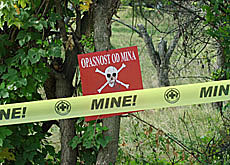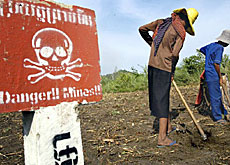Summit puts spotlight on landmines

Officials from 143 countries, including Switzerland, are attending a major summit on landmines in the Kenyan capital, Nairobi.
Switzerland is home to many anti-mine organisations and has long been involved in the fight to ban these deadly weapons.
The state secretary for foreign affairs, Franz von Däniken, is representing Switzerland at the talks, which are expected to focus on stepping up demining efforts and stockpile destruction.
The week-long meeting, which began on Monday, is the first review conference of the Ottawa Convention banning anti-personnel mines.
The treaty, which has been signed by 143 countries, entered into force five years ago and aims to put a permanent end to the trade and use of these weapons, which claim between 15,000 and 20,000 victims each year.
The Swiss delegation is presenting its strategy for 2004 to 2007, which includes promoting the application of the convention and support for countries affected by landmines.
Success story
Since 1999, the agreement has resulted in the destruction of around 37 million mines and has led to a dramatic decrease in the production and exportation of these weapons.
It has also helped to reduce the number of people maimed and killed by mines through clearance and awareness programmes.
But some experts, including the Austrian president of the summit, Wolfgang Petritsch, worry that the treaty has become a victim of its own success – losing ground to other humanitarian crises and becoming overshadowed by issues such as the “war on terror”.
“In the 1990s, worldwide attention was being directed towards the victims and the humanitarian side of these terrible weapons,” Petritsch told swissinfo.
“Then it sort of subsided due to many other tragedies… but I hope this summit will help people realise that despite our great success, it’s still an unfinished job,” he said.
Challenges
It is hoped that the Nairobi gathering will speed the demining process in heavily affected countries like Angola, Bosnia-Herzegovina, and Cambodia.
Boosting efforts to eliminate stockpiles is also a major objective of the conference, with around ten million mines yet to be destroyed in 17 countries.
Over the past five years, the international community has spent $2.2 billion (SFr2.57 billion) on the fight against landmines, and summit leaders hope to see financial pledges increase during the talks.
For its part, Switzerland has put a total of SFr48 million towards the fight since 1999 and continues to back the work of agencies like the International Centre for Humanitarian Demining in Geneva.
Opting out
So far, the United States, Russia, China, India and Pakistan have refused to sign up to the treaty, despite the fact that they collectively hold around 180 million anti-personnel mines.
Some humanitarian experts say that until the US is prepared to set an example by becoming a signatory, there will be little incentive for the remaining outsiders to sign up as well.
But Petritsch points out that the US has not used anti-personnel mines since 1991 and spends more money on mine clearance and victim assistance than any other country.
He also says he is confident that it is just a matter of time before all governments decide to get on board.
“This convention is the best way forward to fully and totally eliminate landmines and make the world a safer place,” said Petritsch.
swissinfo, Anna Nelson in Geneva
Anti-personnel mines claim between 15,000 to 20,000 victims each year.
They lie dormant until a person or an animal triggers their detonating mechanism.
143 countries have signed up to the Ottawa Convention
But the United States, Russia, China, India and Pakistan have all refused to sign up.

In compliance with the JTI standards
More: SWI swissinfo.ch certified by the Journalism Trust Initiative

You can find an overview of ongoing debates with our journalists here. Please join us!
If you want to start a conversation about a topic raised in this article or want to report factual errors, email us at english@swissinfo.ch.